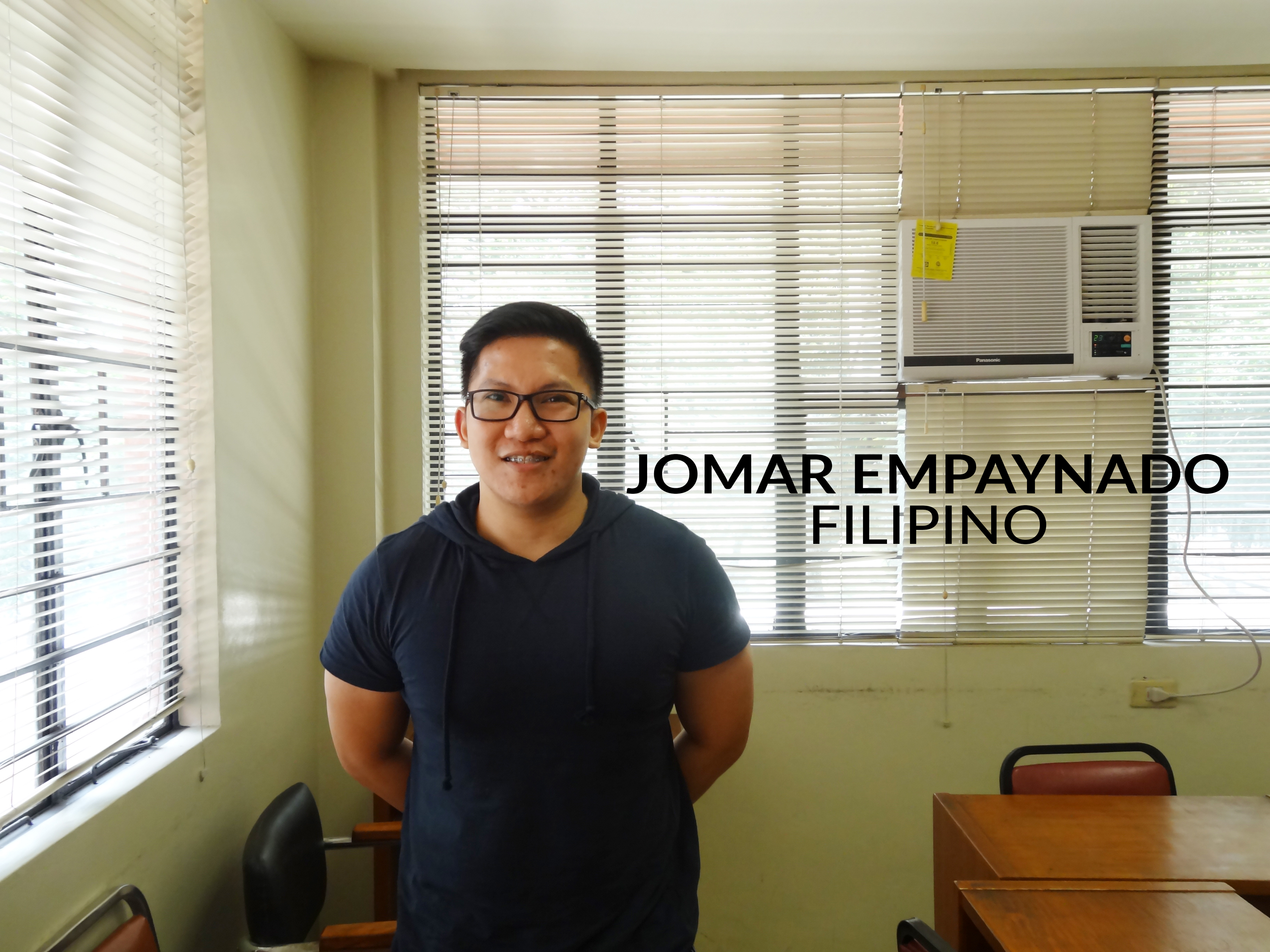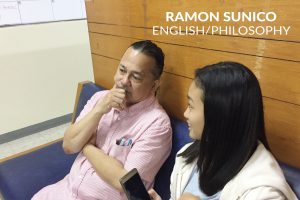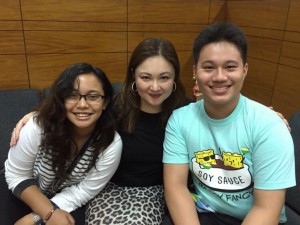Mr. Jomar Empaynado is a professor who teaches FIL11, FIL12, and FIL14 to freshmen and sophomores of all courses, and especially, Foreign Filipino classes. For Teachers’ Appreciation Week 2016, Lucas Po interviewed him about his insights on the teaching profession and the Filipino subject.
Lucas Po (LP): First of all, in your own words, what do you teach here in Ateneo?
Jomar Empaynado (JE): I teach Filipino under the Filipino Department [under] the School of Humanities. I teach mostly Filipino for foreigners because my field is linguistics, [as well as] FIL12, which is Filipino popular culture and writing.
LP: Alright, interesting. So what made you want to teach as a profession? What got you into teaching?
JE: Like any regular or ordinary high school student, I didn’t really know what to take in college. It just so happened that in the public school [I went to], [there were these] so-called student-teachers, where the teacher will choose his best student for the week to be the student-teacher. So my former teachers told me that I had the potential to teach or lead because I can manage the classroom and [that] I [was] eloquent and articulate [in delivering] a particular content. So I decided, “Why not give it a try?” I pursued a Bachelor’s Degree in Education, Masters in teaching Filipino, and a PhD in Linguistics. Mula doon sa point na hindi [ko] alam iyong gusto [ko], doon pala [ako] rarating sa tamang direksyon. Ang dami kong choices noon. Na-overwhelm ako kasi ang mga kaklase ko ay pumunta sa MAPUA, kaya gusto ko rin sumama sa kanila at kumuha ng Industrial Engineering. Hindi para sa akin iyon, kaya naman kahit nag-take ako ng exam at pumasa ako, na-realize ko na hindi ko gusto. Gusto ko talaga [noon ay] Journalism, kaya nag-apply ako sa UP, pumasa ako sa UPCAT ng Journalism, pero hindi ko gusto ang environment.
(I reached the right direction starting from the point where I didn’t know what I wanted. I had a lot of choices then. I was overwhelmed since my classmates all went to MAPUA; I wanted to be with them and applied for Industrial Engineering. Industrial Engineering wasn’t really my thing, which is when I realized that even though I took the exam and passed, I didn’t want it at all. What I really wanted [then] was Journalism, so I applied in UP and passed the UPCAT for it, but I disliked the environment.)
LP: Bakit ho? (Why?)
JE: Kasi siyempre, napaka-liberal. Napakagulo that time sa UP dahil sa mga frat war menace. I decided to take Education in the Philippine Normal University. Mula noon, nakita ko na para ako sa pagtuturo. Nag-eenjoy ako [kapag] nakikita ko ang mga estudyante na natututo sila. Hindi ko na kailangang maging sikat kasi ina-appreciate nila [ako]. Napaka-multifaceted pala ng pagiging teacher: Rock star ka kapag nasa platform ka, kaibigan ka ng mga estudyante o kaaway ka ng mga estudyante at worst. Nagtutulak at humahamon sa akin na manatiling maging teacher, kasi sa totoo lang, mahirap maging teacher kasi students can make or break you, lalo ngayon napaka-challenging na ng mga estudyante, iba ang needs and demands nila. Hindi mo alam kaya dapat marunong ka mag-decipher, maging sensitive. Iyon ang challenge doon. Ang point [nito] mula sa hindi pagiging tiyak patungo sa pagiging tiyak, makikita mo ang sarili [mo] in between.
(Of course, it was too liberal. UP then was in a state of unrest because of the frat war menaces. I decided to take Education in the Philippine Normal University. From then on, I saw that I was made for teaching. I enjoy myself whenever I see students learning. I didn’t have to be famous because my students appreciate me. Being a teacher is pretty multifaceted: You’re a rock star if you’re on the platform, and you can be your student’s friend or their enemy at worst. Being a teacher pushes and challenges me, because honestly, being a teacher is rough since students can make or break you, especially now that students have become challenging, and their needs and demands are different per individual. You have no clue about this, which is why you need to know how to decipher them and be sensitive. That’s the challenge. My point is that, from being unsure to becoming sure, you can find yourself in between.)
LP: If I understand it right, [your decision to teach] was a gradual process throughout college.
JE: Kasi naniniwala ako at lahat naman, hindi naman nila alam kaagad kung anong gusto nila. Pero eventually, pag nakita mo ang sarili mo na nag-mamature ka, nakikita mo rin kung anong gusto mo. Ibig sabihin, ako, mula sa hindi ko alam, patungo sa gusto ko hanggang sa minahal ko.
(Because I believe, along with everyone else, that they don’t immediately know what they really want [to do]. But eventually, once you see yourself maturing, you’d get to see what you really want. What I mean is that, from knowing nothing at all, I went to something I like, until I ended up loving it.)
LP: That was an interesting point you’ve made since there’s a lot of seniors or upperclassmen that don’t know what they’re going to do after college. What you’re trying to say is that it’s really a gradual process.
JE: And one thing pa pala, kasi yung pinili kong area, o content, is Filipino. So bakit hindi ako nag-Math, bakit hindi ako nag-Science, bakit hindi ako nag-English? Sa palagay ko kasi, iyong mga fields na iyon are very established na. Ang dami nang napaunlad ng mga disciplines na iyon. Kasi gusto ko rin, sa sarili ko, na makita kung saan ako kapaki-pakinabang or be useful, so nakita ko yung area ng Filipino, ang dami pang dapat gawin para ma-establish itong discipline na ito. So pinili ko, Filipino, hindi dahil this is the language I am comfortable in, kundi sa palagay ko, dito ako mas magiging kapaki-pakinabang.
(Oh, and one more thing, since I chose Filipino as my specialization. So why is it that I didn’t take Math, Science, or English? Because, in my opinion, those fields are already very well-established. Those disciplines have already caused progress in many areas. Because I also wanted to see for myself just where I can be useful, and so I saw the area in Filipino, and [I figured] that a lot should be done to establish this particular discipline. I chose Filipino, not because [it] is the language that I am comfortable in, but because I feel that I can be more useful here.)
LP: That’s good. I like that you’re making a legacy or establishing something. If I’m not mistaken, you teach Filipino for foreigners, [FIL] 11 and 12, and the majority of people you teach are freshmen, who are new to the college experience. So for the freshmen who are reading this article, what is your advice for these people who are new in Ateneo? What is your advice for freshmen?
JE: Una, bago tayo pumunta sa advice, tingnan muna natin kung ano iyong usual profile ng mga estudyante na pumapasok dito. Madalas, sila ay ranging from upper middle class pataas, diba? Nanggagaling ang advice ko sa vantage point ng pagiging isang Filipino teacher. Madalas, ang mga estudyante na nahawakan ko ay ayaw na ayaw ng Filipino. Kasi para sa kanila, mahirap ito, sayang oras ito. Siguro, ang advice ko ay para sa people who have this negative attitude towards the subject and the language. These are the same people having difficulty studying the language and therefore, ito rin ang mga students na bumabagsak at nakakuha ng mababang grade sa mga klase namin. So ang unang-una kong advice sa kanila, to adapt in the Ateneo culture, be open. Maging bukas sa lahat ng posibilidad, especially in this opportunity ng pagkatuto. Hindi naman bubuksan ang isang area of discipline kung sayang lang [ito] sa oras at pera. The curriculum is solely designed to develop the so-called Ateneo quality.
Second, compared [to] other universities, mahirap sa Ateneo kasi na-mamaximize ang oras, namo-monitor ang lahat. Kailangan ng sincerity and faithfulness in managing your time. Timbangin mo ang oras.
Sumunod ay magbasa. Hindi nagiging equipped ang mga students [because] of the distractions, so kinakailangang laging magbasa. Napakapalad natin because of the library we have.
Sumunod, magkaroon ng positive disposition sa sarili, kasi kapag may positibong disposisyon ka, magkakaintindihan ang pananaw mo sa lahat. Kasi ngayon, isa kami sa mga faculty na nasisisi kung bakit dumadami ang mga student-at-risk (STARS), kasi dinaragdagan daw namin ang mga pressure sa kanila. Sa palagay namin, hindi, kasi kung tutuusin, dapat kayong mga estudyante, matuto kayong makipag-communicate. Marami kasing hindi marunong makipag-communicate. Kung marunong sila mag-communicate, ang akala nilang mahirap ay mawala pag marunong mag-communicate. Iyon ang mga [payo ko].
Una, maging bukas. Ikawala ay marunong magtimbang sa oras at prioridad. Ikatlo naman siguro ay magbasa. Sa huli, magkaroon ng positibong disposisyon.
(First, before we go to advice giving, let’s first check out what the usual profile is for the students who go here. Usually, they range from those who belong to the upper middle class and above, right? My advice for them comes from the vantage point of being a Filipino Teacher. Usually, the students I handle really dislike Filipino. Usually, for them, it’s difficult and a waste of time. My advice would probably go to the people who have this negative attitude towards the subject and the language. These are the same people who are having difficulty studying the language; and therefore, they are the ones who fail and get low grades in our class. So my first advice to them is to adapt in the Ateneo culture, [and] be open. Be open to all possibilities, especially in this opportunity of learning. An area of discipline would not be open if it’ll only a waste of time and money. The curriculum is solely designed to develop the so-called Ateneo quality.
Second, compared [to] other universities, it’s difficult in Ateneo because time is maximized and everything is monitored. There has to be sincerity and faithfulness in managing your time.
Next, always read a lot. Students aren’t equipped because of the distractions, so you should always read. We are very fortunate for the library we have, so make use of it.
Next, have a positive disposition about yourself to have a better understanding of things. Because now, we, the faculty, are being blamed for the increase of students-at-risk (STARS) because we supposedly add pressure to them. From how we see it, no, for the record, you students should learn how to communicate. A lot of students don’t know how to do so. If they knew how to communicate, what they think is hard would eventually become easier in the future because the problem is addressed. Those are my pieces of advice.
First, be open. Second, manage your time and priorities. Third, read more. Finally, have a positive disposition.)
LP: So adding on what you said about what students should be doing, define in your opinion, a good class versus a bad one. Parang (Like), a class that you would enjoy versus one you would not enjoy.
JE: [My] Fil for foreigners class, noong 2016, napakaganda ng klase na iyon. Kasi unang-una, hindi lahat ng [estudyante sa] class na iyon liked the subject, but they engaged. Aside from the fact that I am engaging them, they really have this initiative to engage themselves. Ang pagtuturo is a two-way process. What you see is what you get. Minsan, may mga professor na dumarating sa punto na ayaw nilang magturo dahil walang effort na pinapakita ang bata. Pero ang teacher, lalong nagiging masigasig, diligent, at creative dahil din sa mga estudyante. Of course, ang gusto ko, iyong mga may appreciation kahit hindi ganoon kahusay, but really appreciates the subject.
(My Filipino for foreigners class this 2016, which was great, because at first, not everyone in that class liked the subject, but they engaged [anyway]. Aside from the fact that I am engaging them, they have the initiative to engage themselves. Teaching is a two-way process. What you see is what you get. Sometimes, there would be some professors who reach the point where they no longer want to teach because the kids don’t show any kind of effort. But the teacher becomes more determined, more diligent, and more creative because of the students. That’s what I want—those students who show appreciation to the subject, even if they’re not very good at it.)
LP: So passion is what you want to see in your students. Whether or not they’re good in Filipino, if you see the excitement, if there’s interest in the class, that’s what you look for.
JE: Exactly, of course. I am not expecting that you really memorize all the topics we discussed in the syllabus [from] cover to cover. For me, what matters [the] most is really learning. At the end of the day, at the end of the semester, ano nagawang pagbabago ng course na ito? (At the end of the day, at the end of the semester, what change or changes did this course do for you?)
LP: So what is the most memorable teaching experience? Like, one tiny… one moment that made you say “this is why I’m here in Ateneo, this is why I’m teaching.”
JE: Wala pa akong one moment na na-realize ko kung bakit ako nandito. Kasi lahat iyon, mula sa simula hanggang sa ngayon, ang dahilan kung bakit ako nandito sa Ateneo. Even though most of my colleagues are teaching sociology, anthropology, and all these big concepts, and I am teaching Filipino for foreigners; I’ve found my niche, I’ve found my turf. [What I’m thankful for the Ateneo is, aside from the passion for excellence or pursuit of excellence, that the community is very kind and very generous. For me, it’s very ideal. Siguro, kung meron mang isang moment, ito ay noong nakita ko ang mga estudyante ko sa FIL 12 last year na na-appreciate ang mga simpleng bagay na nagamit sa Filipino kahit na ito ay usapin ng popular culture o culture in general.
(There is nary a moment when I would realize why I’m here. Because everything [I’ve experienced], from the beginning [of my teaching career] to the present, is the reason why I’m here in Ateneo… Maybe, if I could name one moment, it would have to be the time when I saw my students in FIL 12 last year appreciating even the simplest things used in Filipino even when it’s a chat about pop culture or culture in general.)
LP: Filipino is a subject that many students, especially under you, dislike or sideline in favor [of] other subjects like Math or English. As a Filipino professor in the academe, what is your opinion on this and what do you want to tell one of these students who have this mindset that Filipino is hard, a drag, or hassle lang? What would you tell them if you were to [have a] one-on-one conversation with them?
JE: Una, gusto kong sabihin na language bias iyan. Ang ibig-sabihin, biased ka lang o may language loyalty ka. For example, lumaki ka sa isang bahay na ang wika mo’y Ingles. Comfort zone mo iyon. Ibig sabihin, ikaw ang may problema, dahil takot kang lumabas doon sa comfort zone. Sa totoo lang, sa karanasan ko bilang language professor, problema iyan hindi lang ng Filipino, kundi maging sa iba pang community. For example, may isa akong kaibigan na German na nagtatapos ng thesis ngayon. Hirap na hirap siyang sumulat sa Deutsch. Mas gusto niya sumulat sa Ingles. Pero, dahil sa adviser niya, he was forced to write his thesis in Deutsch. Sa atin kasi, sa Pilipinas, we perceive English [as] the language of the privileged, [while] Filipino [is seen as] a limited language. Doon nanggagaling ang language biases and loyalty. If you remove those biases, sa totoo lang, makikita mo na talagang worth it na pag-aralan ang Filipino, hindi siya sayang sa oras. Kasalanan din ito ng kultura natin na pinalaki tayo na sooner or later, lalabas tayo sa bansa at doon mas magagamit ang Ingles, without thinking na mag-aaral tayo at gagamitin natin dito sa Pilipinas [ang Filipino] para paunlarin ang bansa. Napakalaking factor ang language sa national development—economic o scientific man iyan. Kasi laging tool ng isang intellectual society, ng isang developed society, ang kanyang wika. Ang language bias ay problema ng society, but I’m challenging you to let go of your biases, embrace Filipino, and apply it for your contribution to the [nation’s] development. Ganoon tayo pinapalaki ng Ateneo community, diba? Anong magagawa natin sa ating kapwa, sa ating komunidad? Kung magne-negosyo ka lang para maging kapitalista, totoo bang napapaunlad mo ang kapwa mo at bansa mo, o basta papaunlad mo ang sarili mo, kaya pinipili mo ang wika kung saan mas comfortable ka?
(First, I want to point out that that’s language bias. What that means is that you’re biased towards a language, i.e., you’ve got language loyalty. For example, you grew up in a home where English is the norm. [Speaking English] is your comfort zone. What that means is that you yourself are the problem, because you refuse to go out of your comfort zone. For the record, based on my experiences as a language professor, that’s a problem that’s prevalent not only among Filipinos, but also in other communities. For example, I have this German friend who had just finished his thesis. He had a difficult time writing [his] thesis in Deutsch because he preferred writing in English. However, thanks to his adviser, he was forced to write it in Deutsch. Because we people here in the Philippines perceive English as the language of the privileged, while Filipino is seen as a limited language. That’s where language biases and loyalty comes from. If you remove those biases, honestly, you would see that Filipino is a language worth learning; it’s not a waste of time. It’s our culture’s fault for raising us to think that sooner or later, we’d go out of the country and speak more English there, without thinking that we should study and use Filipino here in the Philippines in order better develop the Philippines. Language is a huge factor in national development—whether it be economically-related or scientifically-related, because the omnipotent tool used by an intellectual and developed society is its own language. Language bias is a problem of society, but I’m challenging you to let go of your biases, embrace Filipino, and apply it for your contribution to [the nation’s] development. That’s how the Ateneo raised us, right? What can we do for others, for our community? If you’re going to engage in business just to become a capitalist, would you really help develop yourself, your countrymen, and your country, or would you only benefit yourself, which is why you’re using the language you’re most comfortable in?)
LP: All right. So what legacy do you want your students to remember you [for]? You are teaching the future CEOs, the future doctors, the future professionals in the Philippines, what do you want them to remember from your Filipino class?
JE: Ako, gusto ko lang, ay maalaala nila na kahit maging doktor sila, engineer sila, na magamit nila ang Filipino sa field or discipline nila. Kasi sa pamamagitan noon, nagkakaroon ng opportunity ang Filipino na magamit, na dapat sana ay matagal na panahon nang naggagamit. Sana maalala nila na kasama ng pagdevelop ng skills nila ay ma-realize nila na ang Filipino as a language ay isang mainam na kasangkapan o tool para ma-engage ang sarili nila sa disciplines na meron sila. Hindi ito laging nakasalalay sa English.
(What I want is just for them to remember that, even if they become doctors or engineers in the future, they should still use the Filipino language in their respective fields or disciplines. Because through that, the Filipinos get the opportunity to use the language that they should’ve used a long time ago. I hope that they remember that along with the development of their skills, they realize that Filipino as a language is an important tool used for engaging themselves in the disciplines that they have. These disciplines aren’t always dependent on English.)
Follow the Teachers’ Appreciation Week page, to know more about professors in Ateneo de Manila!
Check out these professors in Teachers’ Appreciation Week:





Pingback: Sir Gilbert Que: A Clash of Cultures - Elements Magazine
Pingback: Fr. Daniel Sormani: A Life Called to Love - Elements Magazine